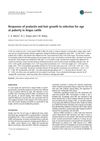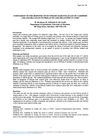 41 citations,
September 1991 in “Medical hypotheses”
41 citations,
September 1991 in “Medical hypotheses” Prolactin may be important for skin growth and immune function.
 38 citations,
June 2015 in “Expert Opinion on Therapeutic Targets”
38 citations,
June 2015 in “Expert Opinion on Therapeutic Targets” Blocking the prolactin receptor might help treat various diseases, but more research is needed.
 37 citations,
March 2010 in “British Journal of Dermatology”
37 citations,
March 2010 in “British Journal of Dermatology” Oestrogen and thyrotropin-releasing hormone affect prolactin and its receptor in human skin and hair, suggesting new treatment options for related conditions.
 36 citations,
November 2009 in “Journal of Investigative Dermatology”
36 citations,
November 2009 in “Journal of Investigative Dermatology” Prolactin may affect hair growth differently based on gender and scalp area.
 24 citations,
April 2013 in “PLOS ONE”
24 citations,
April 2013 in “PLOS ONE” TNFα, IFNγ, and Substance P significantly affect prolactin levels in human skin, suggesting new treatments for skin and hair conditions.
18 citations,
November 1998 in “Comparative biochemistry and physiology. Part A, Molecular & integrative physiology” Changes in prolactin and DHEA levels are not required for the start of mink hair growth cycles.
 14 citations,
June 2001 in “Endocrinology”
14 citations,
June 2001 in “Endocrinology” Prolactin affects when mice shed and grow hair.
 12 citations,
May 2012 in “Endocrinology and metabolism/American journal of physiology: endocrinology and metabolism”
12 citations,
May 2012 in “Endocrinology and metabolism/American journal of physiology: endocrinology and metabolism” Human scalp hair follicles can be used to study how prolactin affects hair growth and cell death.
12 citations,
September 1999 in “The journal of experimental zoology/Journal of experimental zoology” Prolactin levels do not control the start of winter fur growth in mink.
 10 citations,
October 1992 in “Hormone and Metabolic Research”
10 citations,
October 1992 in “Hormone and Metabolic Research” Finasteride safely lowers DHT levels without affecting hormone levels, helping with conditions like enlarged prostate, acne, and hair loss.
 7 citations,
March 2021 in “Journal of animal science/Journal of animal science ... and ASAS reference compendium”
7 citations,
March 2021 in “Journal of animal science/Journal of animal science ... and ASAS reference compendium” Blocking prolactin increases the activity of secondary hair follicles in cashmere goats.
 6 citations,
September 2010 in “Animal”
6 citations,
September 2010 in “Animal” Selecting Angus cattle for earlier puberty lowers prolactin levels but doesn't affect hair growth.
 3 citations,
May 2018 in “Reproductive Sciences”
3 citations,
May 2018 in “Reproductive Sciences” The drug BAY 1158061 is safe, well-tolerated, and shows potential for treating diseases related to prolactin.
 1 citations,
April 2015 in “Journal of Dermatology and Dermatologic Surgery”
1 citations,
April 2015 in “Journal of Dermatology and Dermatologic Surgery” People with certain skin diseases have higher levels of the hormone prolactin in their blood.
 1 citations,
March 1994 in “Proceedings of the British Society of Animal Production”
1 citations,
March 1994 in “Proceedings of the British Society of Animal Production” Prolactin and melatonin affect the growth of Angora and Cashmere goat hair differently.
 June 2024 in “Journal of medicinal chemistry”
June 2024 in “Journal of medicinal chemistry” A new AI-driven method shows promise for treating hair loss with a peptide-based drug.
 January 2024 in “World Journal of Biology Pharmacy and Health Sciences”
January 2024 in “World Journal of Biology Pharmacy and Health Sciences” High prolactin and low vitamin D levels may be linked to hair loss in women.
 October 2023 in “Journal of the Endocrine Society”
October 2023 in “Journal of the Endocrine Society” A woman's excessive hair growth was linked to a rare case of high testosterone caused by a prolactin-producing pituitary tumor.
 August 2023 in “Journal of Clinical Medicine”
August 2023 in “Journal of Clinical Medicine” Metformin lowers prolactin in women without PCOS but not in those with PCOS, where it reduces other hormones instead.
 February 2021 in “Facta Universitatis”
February 2021 in “Facta Universitatis” Too much prolactin can cause menstrual problems, infertility, and sexual issues in women.
 January 2021 in “Benha Journal of Applied Sciences”
January 2021 in “Benha Journal of Applied Sciences” Prolactin levels and gene polymorphism are not linked to vitiligo severity but are related to BMI.
 December 2022 in “Small methods”
December 2022 in “Small methods” A new hair loss treatment using dissolving microneedles was found to speed up hair growth and was more effective than daily use of common hair growth drugs.
August 2022 in “Theriogenology” Neurosteroids affect prolactin levels in sheep differently depending on stress and pregnancy conditions.
 10 citations,
April 1995 in “Animal Science/Animal science”
10 citations,
April 1995 in “Animal Science/Animal science” Melatonin implants can change the seasonal prolactin levels and hair growth in adult cashmere goats but not in juveniles, and don't delay spring moult for better fiber harvesting.
 December 2024 in “Journal of Medicinal Chemistry”
December 2024 in “Journal of Medicinal Chemistry” A new topical treatment for hair loss shows promise by targeting androgen receptors.
 January 2021 in “Turkiye Klinikleri Journal of Dermatology”
January 2021 in “Turkiye Klinikleri Journal of Dermatology” Women with a certain type of hair loss had lower levels of a hormone called prolactin compared to healthy women.
 October 2017 in “The Indian Journal of Animal Sciences”
October 2017 in “The Indian Journal of Animal Sciences” The prolactin gene polymorphism doesn't affect cashmere quality in these goats.
 8 citations,
May 2022 in “Orphanet Journal of Rare Diseases”
8 citations,
May 2022 in “Orphanet Journal of Rare Diseases” The UD-PrOZA program successfully diagnosed 18% of adult patients with rare diseases, often using genetic testing.
 100 citations,
July 2004 in “The Journal of Sexual Medicine”
100 citations,
July 2004 in “The Journal of Sexual Medicine” Hormones like estrogen, testosterone, progesterone, and prolactin play complex roles in female sexual function, with testosterone potentially improving sexual desire, arousal, and satisfaction. However, more research is needed to establish safe and effective hormone treatments for female sexual dysfunction.


























